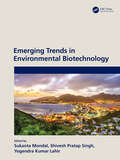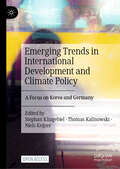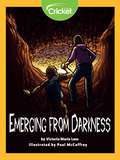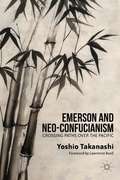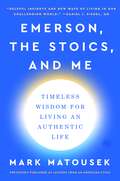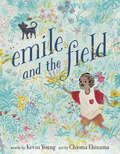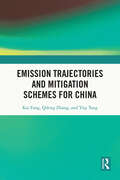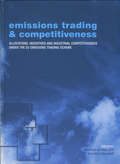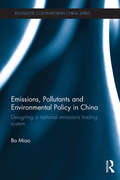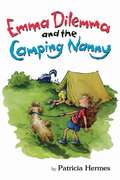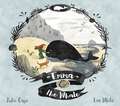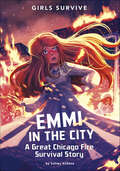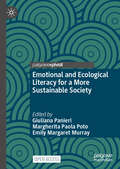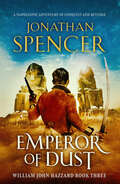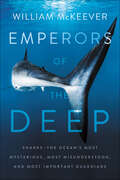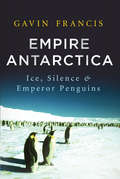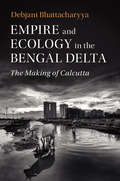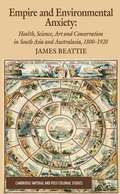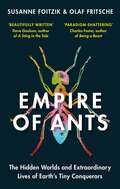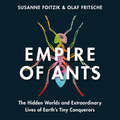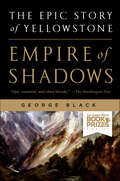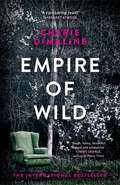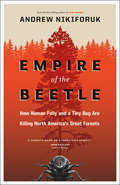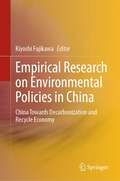- Table View
- List View
Emerging Trends in Environmental Biotechnology
by Sukanta Mondal Shivesh Pratap Singh Yogendra Kumar LahirThe environment is an all-encompassing component of the ecosystem of "Blue planet - the earth", made up of the hydrosphere, atmosphere and lithosphere. These three spheres have biotic and abiotic components which exhibit ecological homeostasis that provides the most appropriate survival chances for the members of biotic component and geochemical balance with abiotic components. This ecosystem is subjected to relatively harsh conditions, mostly created by the disastrous activities due to natural calamities and intentional and/or accidental anthropogenic activities. Biotechnology has become a potential tool to dissipate such environmental impacts because of the advancement it has undergone recently. Emerging Trends in Environmental Biotechnology is an outstanding collection of current research that integrates basic and advanced concepts of biotechnology such as genomics, proteomics, bioinformatics, sequencing, and imaging processes to improvise and protect the environment. This book is particularly attractive for scientists, researchers, students, educators and professionals in environmental science, agriculture, veterinary and biotechnology science. The book will enable them to solve the problems about sustainable development with the help of current innovative biotechnologies such as recombinant DNA technology and genetic engineering which have tremendous potential for impacting global food security, environmental health, human and animal health and overall livelihood of mankind. Features Presents easy-to-read chapters Information is presented in a very accessible and logical format Identifies and explores biotechnological approaches for environmental protection Encompasses biodegradation of hazardous contaminants, biotechnology in waste management, nanotechnology, and issues in environmental biotechnology research
Emerging Trends in International Development and Climate Policy: A Focus on Korea and Germany
by Stephan Klingebiel Thomas Kalinowski Niels KeijzerThis open access book delves into the considerable alignment of global sustainable development priorities between Germany and the Republic of Korea (hereafter referred to as Korea), despite their geographical separation. Notably, both nations share a common commitment to development policy and international climate action, an alignment that holds immense potential for enhanced cooperation in today’s evolving global landscape. Germany’s historical role as a founding member of the international development cooperation system juxtaposes with Korea’s more recent entry into the Organisation for Economic Co-operation and Development (OECD) and its Development Assistance Committee (DAC) in 2010. Korea has transformed from a significant development assistance recipient to an active provider, a transition mirrored in its engagement in international climate finance. Within this dynamic context, the book thoroughly examines key aspects such as the evolving development policy profiles of Germany and Korea, their roles in international organizations, and their shared commitment to international climate policies. It also explores avenues for deeper collaboration between these like-minded partners, all against the backdrop of an evolving geopolitical focus, including the new Indo-Pacific emphasis.
Emerging from Darkness
by Victoria Marie LeesSiblings Michelle and William are out on a caving adventure when they end up losing their way.
Emerson and Neo-Confucianism
by Yoshio TakanashiA comparative investigation of Emerson's Transcendental thought and Zhu Xi's Neo-Confucianism, this book shows how both thinkers traced the human morality to the same source in the ultimately moral nature of the universe and developed theories of the interrelation of universal law and the human mind.
Emerson, the Stoics, and Me: Timeless Wisdom for Living an Authentic Life
by Mark Matousek“This is a beautiful book, full of ideas that could help restore America’s genius for freedom and promise.” —Thomas Moore, New York Times bestselling author of Care of the SoulA lifelong Emersonian scholar, teacher, and spiritual seeker reveals how American philosopher Ralph Waldo Emerson’s twelve essential teachings hold the answer to living an authentic and fulfilling life, one that is in harmony with our souls.Ralph Waldo Emerson was a spiritual revolutionary whose profound vision of human potential came to define the American character. Known as America’s original Stoic, he offered a radical message of optimism, authenticity, and self-realization that is more necessary today than ever.In this timely, remarkable book, noted memoirist and teacher Mark Matousek reveals the depths of Emerson’s extraordinary wisdom, demonstrating how his timeless philosophy can help us navigate the challenges of contemporary life. Using personal stories, psychological research, and life lessons from Emerson and his contemporaries—including Thoreau and Whitman—he offers practical lessons in the art of living.They include:ON ORIGINALITY—Character is everythingON PERSPECTIVE—You are how you seeON NONCONFORMITY—Build your own worldON RESILIENCE—Without confidence, the universe is against youON VITALITY—A stream of power runs through youAnd moreEmerson’s far-reaching vision of excellence and spiritual flourishing is the medicine we need to heal ourselves. “Trust yourself,” he teaches. “Once you make a decision, the universe conspires to make it happen.” This philosophy of hope, known as transcendentalism, is the vein of gold in the American psyche. Lessons from an American Stoic helps us to reclaim our national treasure.
Emile and the Field
by Kevin YoungIn this lyrical picture book from an award-winning poet, a young boy cherishes a neighborhood field throughout the changing seasons. With stunning illustrations and a charming text, this beautiful story celebrates a child's relationship with nature. There was a boynamed Emilewho fellin love with a field.It was wideand blue--and if you could haveseen itso would've you.Emile loves the field close to his home--in spring, summer, and fall, when it gives him bees and flowers, blossoms and leaves. But not as much in winter, when he has to share his beautiful, changeable field with other children...and their sleds. This relatable and lyrical ode to one boy's love for his neighborhood field celebrates how spending time in nature allows children to dream, to imagine...and even to share.
Emission Trajectories and Mitigation Schemes for China
by Kai Fang Qifeng Zhang Yiqi TangThis book seeks to model the possible emission trajectories and identify the feasible mitigation schemes for China to meet its climate commitments to peak emissions before 2030 and net zero emissions before 2060. In line with these ambitions, China has taken a number of measures to improve carbon efficiency and energy structure in recent years. The book first analyzes changes in the carbon footprint at the city level, identify the different pathways to peak emissions by province and industry, and develop a bottom-up approach to determining when and how China could reach peak emissions. It then illustrates how the Emissions Trading Scheme (ETS) reduces abatement costs, and examines the cost-saving effects under carbon intensity reduction and peak emissions targets. Based on the findings and the status quo in China, the authors propose a multicriteria allocation scheme for carbon emission allowances at the provincial level and quantify the impact of sectoral coverage on the abatement costs of the ETS by developing a cost-based approach to sectoral coverage in China. In addition, the co-benefits between CO2 and PM2.5 reductions as a result of the ETS operation are elaborated. The book will benefit researchers and policy-makers interested in environmental governance, climate policy, environmental economics, and sustainable development.
Emissions Trading and Competitiveness: Allocations, Incentives and Industrial Competitiveness under the EU Emissions Trading Scheme (Climate Policy Series)
by Michael GrubbComplying with the forthcoming tightening of CO2 emission allocations in the EU may mean big bills for the industries affected. In this special issue of Climate Policy journal, leading experts examine the impacts on competitiveness and the commercial incentives available from the CO2 allowance allocations under the methodologies, and whether - and if so at what stage - the ETS itself may need to be amended. The study is multidisciplinary, combining economic, legal and policy analysis with specific studies of impacts on electricity, cement and other industrial sectors and the allocation issues. It brings together the results of research conducted over the past two year from various research centres and consultancies in Europe, and in particular, work commissioned by the Carbon Trust and Climate Strategies Network. Through these, it presents the most comprehensive and detailed set of analyses yet conducted of the impacts of allocation on competitiveness - one of the most critical issues for the sectors affected and for the operation of the ETS.
Emissions, Pollutants and Environmental Policy in China: Designing a National Emissions Trading System (Routledge Contemporary China Series)
by Bo MiaoAs the world's biggest polluter, the environmental challenges that China faces in controlling its airborne emissions are crucial, not only to its own population in terms of tackling the severe domestic air pollution, but also to the planet as it faces calls from the international community to accept its responsibilities in cutting greenhouse gases. Deteriorating air quality clearly shows that China’s current environmental regime is unsuited to either tackle the rampant domestic air pollution or contribute fairly to international climate action. As such, this book explores the feasibility of applying a national emissions trading system to control multiple air pollutants in China. It begins with an outline of the existing emissions management system and goes onto explore whether a national emissions trading system is a viable choice to combat China’s conventional air pollutants. To this end, there is an in-depth analysis of the two pilot sulphur dioxide emissions trading programs in Taiyuan and Jiangsu, as well as an examination of emissions trading schemes in the US and EU. Finally, the book discusses the key design elements of a multi-pollutant cap-and-trade scheme that addresses both conventional air pollutants and greenhouse gasses. This book will be of great interest to students and scholars interested in the fields of environmental studies, Chinese politics and environmental law. It will also be invaluable to policy makers in the field.
Emma Dilemma and the Camping Nanny
by Patricia HermesNine-year-old Emma O'Fallon finds herself in increasing difficulties as her complicated efforts to break up the growing attachment between Annie, the Irish nanny, and Bo, her boyfriend, cause chaos on a family camping trip and her own relationship with her best friend Luisa seems to be going from bad to worse.
Emma and the Whale
by Julie CaseIn this lyrical picture book with subtle conservation themes, a girl helps rescue a whale who has washed ashore. Here is a beautifully written, moving story that will appeal to all animal lovers, and to those interested in protecting our oceans and marine life. Emma lives in a crooked house in an old whaling town, and often takes her dog, Nemo, to the beach. On their walks, they find amazing treasures, like shells and stones and sea glass—and even a loggerhead turtle. But one day, they find something completely unexpected: a baby whale, washed ashore. Emma empathizes with the animal&’s suffering, imagining what the whale is thinking and feeling. When the tide starts to come in, Emma pushes as the water swirls and rises, and eventually the whale swims free, back to her mother.
Emmi in the City: A Great Chicago Fire Survival Story (Girls Survive)
by Salima AlikhanAlthough Emmi has lived in Chicago for two years, she finds it hard to love her adopted city. As a German immigrant in the early 1870s, she's often teased by her America-born peers. But when the Great Fire breaks out on October 8, 1871, Emmi and her enemies find themselves braving the smoke and flames together. Can Emmi and the others survive the danger to escape the burning city? Readers can learn the real story of the Great Chicago Fire from the nonfiction back matter in this Girls Survive story. A glossary, discussion questions, and writing prompts are also provided.
Emotional Design and the Healthcare Environment (Research for Development)
by Marco Maria Maiocchi Zhabiz ShafieyounFor all of the tremendous advances in medicine and treatment the world has seen in the modern era, the human body’s ability to heal itself remains a (literally) vital and often overlooked facet of healthcare. Through the use of emotional design, aimed at transforming healthcare environments, such as waiting rooms, in such a way as to boost the emotional wellbeing of patients, and thus their general attitudes, including in regard to their own healing processes, medical institutions can improve outcomes for the people they treat while simultaneously lowering overall costs. Design, as an inherently transdisciplinary, problem-solving activity, is well-suited to this task. And when combined with a field of study such as neuroscience, which can literally map out the perceptions that lead to the experience of particular emotions, healthcare environments can be transformed into spaces (through such innovations as Kansei engineering) that then subsequently transform the people who rely on them the most, leading to more efficiency and less red ink.
Emotional and Ecological Literacy for a More Sustainable Society
by Margherita Paola Poto Giuliana Panieri Emily Margaret MurrayThis open access book aims to promote ecological and emotional research and education for sustainability by cultivating values and behaviours consistent with how nature makes us feel connected and nurtured. Built upon the intersection of ecological literacy and socio-emotional learning, grounded in sustainability and relational thinking, the research developed in the book covers a wide range of themes connected to the Agenda 2030.
Emperor of Dust: A Napoleonic adventure of conquest and revenge (William John Hazzard series)
by Jonathan Spencer**Longlisted for Best Published Novel in the Wilbur Smith Adventure Writing Prize 2022**The sands of Egypt carry whispers of rebellion…The much-anticipated third novel in the William John Hazzard series, following Lords of the Nile.Egypt, September 1798. After tragedy at the Battle of the Nile, Hazzard is possessed by a dark vengeance: with the marines of 9 Company and their Bedouin allies he scours the Nile Delta for his nemesis, the French spy-catcher Citizen Derrien.However, among the sacred ibis and ever-shifting sands, Hazzard catches wind of something far more deadly: the stirrings of revolt in Cairo, the outbreak of plague, and the cold hand of Admiralty Intelligence. When riot explodes in the capital, Hazzard fears he is simply too late.Abandoned by the French Government, Napoleon and his army are now trapped in Egypt. When Bonaparte discovers that Al-Djezzar ‘the Butcher’ of Acre is gathering his forces to attack, he accepts the challenge.Riding with the Mamluk and the beautiful Shajar al-Durr, Hazzard engages French cavalry in the shadow of Ozymandias in ancient Thebes – and the Admiralty calls upon him once more as Napoleon launches his bloody crusade on Syria and the Holy Land to become the new Emperor in the East.From flaming battle at sea with the blockade fleet to massacre at the walls of Jaffa and Acre, this is Napoleon’s desperate bid to seize the Orient – and the next explosive chapter of the French occupation of Egypt. Perfect for fans of Bernard Cornwell and Simon Scarrow. Never give up the boat.Praise for Jonathan Spencer‘Eloquently crafted and dripping with richly detailed historical and fictional characters, Emperor of Dust is a riveting tale of heartbreak, anguish, courage and love. Spencer is a master storyteller, captivating and entertaining in ways seldom done in adventure literature today’ Quarterdeck on Emperor of Dust‘This is an outstanding novel, made even more remarkable by its debut status. Better than Sharpe, gripping and intense, Napoleon’s Run deserves to be a runaway success’ Ben Kane, Sunday Times bestselling author of Lionheart on Napoleon’s Run‘Hornblower meets Mission: Impossible. A thrilling, page-turning debut packed with rousing, rip-roaring action’ J. D. Davies, author of the Matthew Quinton Journals on Napoleon’s Run
Emperors of the Deep: Sharks—The Ocean's Most Mysterious, Most Misunderstood, and Most Important Guardians
by William McKeeverWhat we can learn from sharks—evolutionary marvels that have survived for 450 million years, and are essential to our planet’s ecosystem.We’re conditioned to see sharks as terrifying, cold-blooded underwater predators. But as Ocean Guardian founder William McKeever reveals, we need to ensure that their remarkable longevity continues. The first book to reveal in full the hidden lives of sharks, Emperors of the Deep focuses on four species—Mako, Tiger, Hammerhead, and Great White—as never before, including such fascinating details as:Sharks are 50 million years older than treesSharks have survived five extinction level events, including the one that killed off the dinosaursSharks have electroreception, a sixth sense that lets them pick up on electric fields generated by living thingsSharks can dive 4,000 feet below the surfaceSharks account for only six human fatalities per year, while humans kill 100 million sharks per yearMcKeever goes back through time to probe the shark’s prehistoric secrets and how it has become the world’s most feared, and most misunderstood, predator, and takes us on a pulse-pounding tour around the world and deep under the surface, from the frigid waters of the Arctic Circle to the coral reefs of the tropical Central Pacific. He also interviews ecologists, conservationists, and world-renowned shark experts, including the founders of Greenpeace’s Rainbow Warrior, the head of the Massachusetts Shark Research Program, and the self-professed “last great shark hunter.”At once a deep dive into the misunderstood world of sharks and an urgent call to protect them, Emperors of the Deep celebrates this wild species that hold the key to unlocking the mysteries of the ocean—if we can prevent their extinction from climate change and human hunters.“Many astonishing facts.” —The Guardian“[An] extraordinary book [that] rarely fails to inform and delight.” —The Washington TimesIncludes photographs
Empire Antarctica: Ice, Silence & Emperor Penguins
by Gavin FrancisGavin Francis fulfilled a lifetime's ambition when he spent fourteen months as the basecamp doctor at Halley, a profoundly isolated British research station on the Caird Coast of Antarctica. So remote, it is said to be easier to evacuate a casualty from the International Space Station than it is to bring someone out of Halley in winter.Antarctica offered a year of unparalleled silence and solitude, with few distractions and a very little human history, but also a rare opportunity to live among emperor penguins, the only species truly at home in he Antarctic. Following Penguins throughout the year -- from a summer of perpetual sunshine to months of winter darkness -- Gavin Francis explores the world of great beauty conjured from the simplest of elements, the hardship of living at 50 c below zero and the unexpected comfort that the penguin community bring.Empire Antarctica is the story of one man and his fascination with the world's loneliest continent, as well as the emperor penguins who weather the winter with him. Combining an evocative narrative with a sublime sensitivity to the natural world, this is travel writing at its very best
Empire and Ecology in the Bengal Delta: The Making Of Calcutta (Studies In Environment And History )
by Debjani BhattacharyyaWhat happens when a distant colonial power tries to tame an unfamiliar terrain in the world's largest tidal delta? <P><P>This history of dramatic ecological changes in the Bengal Delta from 1760 to 1920 involves land, water and humans, tracing the stories and struggles that link them together. Pushing beyond narratives of environmental decline, Bhattacharyya argues that 'property-thinking', a governing tool critical in making land and water discrete categories of bureaucratic and legal management, was at the heart of colonial urbanization and the technologies behind the draining of Calcutta. The story of ecological change is narrated alongside emergent practices of land speculation and transformation in colonial law. Bhattacharyya demonstrates how this history continues to shape our built environments with devastating consequences, as shown in the Bay of Bengal's receding coastline.<P> The first environmental history of land markets in South Asia.<P> Explores how the law responded to the ecological changes of the Bengal delta and how those laws continue to shape our contemporary relationship to the land and the water.<p> Shows landscapes as essentially fluid and changeable, destabilizing the fixities of cartography.
Empire and Environmental Anxiety
by James BeattieA new interpretation of imperialism and environmental change, and the anxieties imperialism generated through environmental transformation and interaction with unknown landscapes. Tying together South Asia and Australasia, this book demonstrates how environmental anxieties led to increasing state resource management, conservation, and urban reform.
Empire of Ants: The hidden worlds and extraordinary lives of Earth's tiny conquerors
by Olaf Fritsche Susanne Foitzik'Beautifully written and filled with mind-boggling wonders' - Dave Goulson, author of A Sting in the Tale'Thrilling, compellingly readable and paradigm-shattering' - Charles Foster, author of Being a Beast'Both expert and entertaining' - David Barrie, author of Incredible JourneysAnts have been walking the Earth since the age of the dinosaurs. Today there are one million ants for every one of us. The closer you get to ants, the more human they look: they build megacities, grow crops, raise livestock, tend their young and infirm, and even make vaccines. They also have a darker side: they wage war, enslave rivals and rebel against their oppressors. From fearsome army ants, who stage twelve-hour hunting raids where they devour thousands, to gentle leaf-cutters gardening in their peaceful underground kingdoms, every ant is engineered by nature to fulfil their particular role.Acclaimed biologist Susanne Foitzik has travelled the globe to study these master architects of Earth. Joined by journalist Olaf Fritsche, Foitzik invites readers deep into her world - in the field and in the lab - and will inspire new respect for ants as a global superpower.Fascinating and action-packed, Empire of Ants will open your eyes to the secret societies thriving right beneath your feet.
Empire of Ants: The hidden worlds and extraordinary lives of Earth's tiny conquerors
by Olaf Fritsche Susanne FoitzikAnts have been walking the Earth since the age of the dinosaurs. Today there are one million ants for every one of us. The closer you get to ants, the more human they look: they build megacities, grow crops, raise livestock, tend their young and infirm, and even make vaccines. They also have a darker side: they wage war, enslave rivals and rebel against their oppressors. From fearsome army ants, who stage twelve-hour hunting raids where they devour thousands, to gentle leafcutters gardening in their peaceful underground kingdoms, every ant is engineered by nature to fulfil their particular role.Acclaimed biologist Susanne Foitzik has travelled the globe to study these master architects of Earth. Joined by journalist Olaf Fritsche, Foitzik invites readers deep into her world - in the field and in the lab - and will inspire new respect for ants as a global superpower.Fascinating and action-packed, Empire of Ants will open your eyes to the secret societies thriving right beneath your feet.(p) Octopus Publishing Group 2021
Empire of Shadows: The Epic Story of Yellowstone
by George BlackThe story of the conquest of America's majestic national landmark, a landscape uninhabited, inaccessible, and shrouded in myth in the Civil War's aftermath.Los Angeles Times Book Prize Finalist“George Black rediscovers the history and lore of one of the planet's most magnificent landscapes. Read Empire of Shadows, and you'll never think of our first—in many ways our greatest—national park in the same way again.” —Hampton Sides, New York Times–bestselling authorEmpire of Shadows is the epic story of the conquest of Yellowstone, a landscape uninhabited, inaccessible and shrouded in myth in the aftermath of the Civil War. In a radical reinterpretation of the nineteenth century West, George Black casts Yellowstone's creation as the culmination of three interwoven strands of history—the passion for exploration, the violence of the Indian Wars and the “civilizing” of the frontier—and charts its course through the lives of those who sought to lay bare its mysteries: Lt. Gustavus Cheyney Doane, a gifted but tormented cavalryman known as “the man who invented Wonderland”; the ambitious former vigilante leader Nathaniel Langford; scientist Ferdinand Hayden, who brought photographer William Henry Jackson and painter Thomas Moran to Yellowstone; and Gen. Phil Sheridan, Civil War hero and architect of the Indian Wars, who finally succeeded in having the new National Park placed under the protection of the US Cavalry.George Black's Empire of Shadows is a groundbreaking historical account of the origins of Yellowstone—”epic, essential and often bloody” (Washington Post).“Masterful and riveting. . . . Will forever change our understanding and conception of this sacred American place.” —David Grann, #1 New York Times–bestselling author
Empire of Wild: A Novel
by Cherie DimalineA #1 INTERNATIONAL BESTSELLEROne of the most anticipated books of the summer for Time, Harper's Bazaar, Bustle and Publishers Weekly'Deftly written, gripping and informative. Empire of Wild is a rip-roaring read!' Margaret Atwood'Empire of Wild is doing everything I love in a contemporary novel and more. It is tough, funny, beautiful, honest and propulsive' Tommy Orange, author of There There 'Dimaline turns an old story into something newly haunting and resonant' New York Times'Close, tight, stark, beautiful - rich where richness is warranted, but spare where want and sorrow have sharpened every word. Dimaline has crafted something both current and timeless' NPR'Revelatory... Gritty and engaging, this story of a woman and her missing husband is one of candor, wit and tradition'Ms. Magazine Broken-hearted Joan has been searching for her husband, Victor, for almost a year - ever since he went missing on the night they had their first serious argument. One hung-over morning in a Walmart parking lot in a little town near Georgian Bay, she is drawn to a revival tent where the local Métis have been flocking to hear a charismatic preacher. By the time she staggers into the tent the service is over, but as she is about to leave, she hears an unmistakable voice.She turns, and there is Victor. Only he insists he is not Victor, but the Reverend Eugene Wolff, on a mission to bring his people to Jesus.With only two allies - her Johnny-Cash-loving, 12-year-old nephew Zeus, and Ajean, a foul-mouthed euchre shark with deep knowledge of the old Métis ways - Joan sets out to remind the Reverend Wolff of who he really is. If he really is Victor, his life and the life of everyone she loves, depends upon her success.Inspired by traditional Métis legends, Cherie Dimaline has created a propulsive, stunning and sensuous novel.
Empire of the Beetle
by Andrew NikiforukBeginning in the late 1980s, a series of improbable bark beetle outbreaks unsettled iconic forests and communities across western North America. An insect the size of a rice kernel eventually killed more than 30 billion pine and spruce trees from Alaska to New Mexico. Often appearing in masses larger than schools of killer whales, the beetles engineered one of the world's greatest forest die-offs since the deforestation of Europe by peasants between the eleventh and thirteenth centuries. The beetle didn't act alone. Misguided science, out-of-control logging, bad public policy, and a hundred years of fire suppression created a volatile geography that released the world's oldest forest manager from all natural constraints. Like most human empires, the beetles exploded wildly and then crashed, leaving in their wake grieving landowners, humbled scientists, hungry animals, and altered watersheds. Although climate change triggered this complex event, human arrogance assuredly set the table. With little warning, an ancient insect pointedly exposed the frailty of seemingly stable manmade landscapes.Drawing on first-hand accounts from entomologists, botanists, foresters, and rural residents, award-winning journalist Andrew Nikiforuk, investigates this unprecedented beetle plague, its startling implications, and the lessons it holds.
Empirical Research on Environmental Policies in China: China Towards Decarbonization and Recycle Economy
by Kiyoshi FujikawaThis book presents an empirical study of the effects of environmental policies on China and its neighboring countries, with a focus on waste and climate policies in China. The two major carbon policies have to do with carbon markets and renewable energy. The authors first examine the effectiveness of the Asian carbon market. Because of the consumption of goods beyond provincial borders, nationwide carbon markets are rather difficult to operate; therefore, a desirable initial allocation in the carbon market is proposed in this book. As for renewable power, its sources have not been fully utilized owing to a regional mismatch of supply and demand, so optimal locations of renewable energy are shown. The book also contains an analysis of the environmental and economic impacts of changes in resource circulation in East Asia. Although motorization is advancing rapidly, the vein industry for recycling used cars has not progressed. The authors estimate the amount of materials from used cars including new energy vehicles (electric and fuel cell vehicles) and propose desirable policies for used vehicles. East Asia is interdependent with respect to carbon and waste as well as the economy. China has regulated the import of waste recently and has started recycling its own wastes, putting pressure on neigboring countries to recycle their waste domestically. The authors estimate the environmental and economic impacts of such policy changes.
